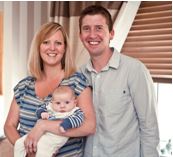Local Hospital Pioneers New More Natural IVF
Hammersmith welcomes first baby born using treatment
Hammersmith Hospital has welcomed the first baby to be born using a new, more natural IVF treatment.
The treatment offers new hope for women at risk of life-threatening complications from traditional fertility treatments has been pioneered at the IVF Unit in London’s Hammersmith Hospital.
A breakthrough study, conducted in conjunction with Imperial College London, looked at the effectiveness of using kisspeptin, a naturally occurring hormone, to induce egg development.
This allows women to avoid the use of the traditional IVF drug which can trigger a serious condition called ovarian hyperstimulation syndrome (OHSS). Women most at risk of OHSS are those with polycystic ovary syndrome (PCOS) – a total of 5-10%.
The study is proving that kisspeptin can be successfully used in IVF treatment, with the first baby, a healthy boy, recently born. Baby Heath was born in April 2013 weighing 7.15lb.
Mr Geoffrey H Trew, consultant in reproductive medicine and surgery at Hammersmith Hospital says: " We’re absolutely thrilled that this study has resulted in the birth of a healthy baby boy.
" Each year, thousands of couples in the UK start families using IVF treatment and if we can work towards eliminating the risk of OHSS, using the naturally occurring hormone kisspeptin, we can hopefully help even more women and make the treatment potentially safer. This is a very exciting breakthrough."
Professor Waljit Dhillo from Imperial College London, who led the study, say: " We have shown that kisspeptin can be used effectively in patients undergoing IVF treatment to more naturally stimulate the release of reproductive hormones and result in a healthy baby.
"The results of the study are very encouraging and whilst we are primarily looking at women most at risk of developing OHSS, there is the potential that kisspeptin could be used across all IVF treatments as a more natural alternative."
A total of 30 women took part in the study and kisspeptin successfully induced egg production during IVF treatment in 29 of the women, with embryos developing in 28. In addition, 11 of 25 participants were pregnant 12 days after receiving an embryo transfer, and one woman has successfully given birth to date.
The study was funded by the Medical Research Council UK and the National Institute for Health Research and the results were presented on June 17 at The Endocrine Society’s 95th Annual Meeting in San Francisco, California.
The team at Imperial College London are now keen to hear from women interested in taking part in studies using kisspeptin as part of IVF treatment. Please contact: kisspeptin.ivf@imperial.ac.uk.
Related links
|
